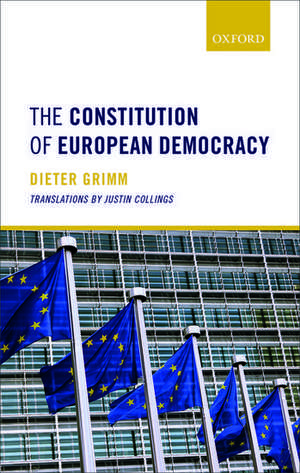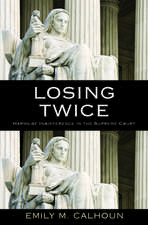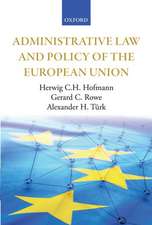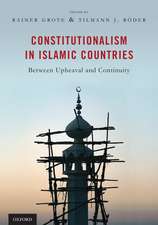The Constitution of European Democracy
Autor Dieter Grimmen Limba Engleză Hardback – 29 iun 2017
Preț: 545.04 lei
Preț vechi: 781.81 lei
-30% Nou
Puncte Express: 818
Preț estimativ în valută:
104.31€ • 108.50$ • 86.11£
104.31€ • 108.50$ • 86.11£
Carte tipărită la comandă
Livrare economică 04-10 aprilie
Preluare comenzi: 021 569.72.76
Specificații
ISBN-13: 9780198805120
ISBN-10: 0198805128
Pagini: 272
Dimensiuni: 145 x 222 x 21 mm
Greutate: 0.48 kg
Editura: OUP OXFORD
Colecția OUP Oxford
Locul publicării:Oxford, United Kingdom
ISBN-10: 0198805128
Pagini: 272
Dimensiuni: 145 x 222 x 21 mm
Greutate: 0.48 kg
Editura: OUP OXFORD
Colecția OUP Oxford
Locul publicării:Oxford, United Kingdom
Recenzii
The Constitution of European Democracy ... [presents] provocative and pioneering ideas. Such critical discussions of the Treaties' structure, the existing democratic framework and generally the entire European project are more necessary than ever after the sovereign debt crisis, the migration crisis and the Brexit decision.
Notă biografică
Dieter Grimm teaches constitutional law at Humboldt University Berlin and the Yale Law School. From 1987-1999 he served as Justice of the Federal Constitutional Court of Germany. From 2001-2007 he was the Director of the Wissenschaftskolleg zu Berlin (Institute for Advanced Study) whose Permanent Fellow he continues to be. He was Visiting Professor at Harvard, New York University, Toronto, Rome, Kolkata, Seoul, Beijing, Shanghai and a Fellow of the Stellenbosch Institute for Advanced Study in South Africa. He is a member of the Berlin-Brandenburgische Akademie der Wissenschaften, the Academia Europaea and the American Academy of Arts and Sciences. He holds honorary doctoral degrees from the universities of Toronto, Göttingen, Porto Alegre, and Bucarest. He has widely published on matters of constitutional law, constitutional history, constitutional theory, comparative constitutionalism, and European Union law.













